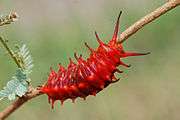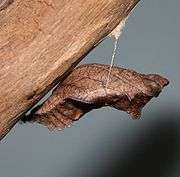Battus (butterfly)
Battus is a New World genus of butterflies that are usually found around pipevine (genus Aristolochia) plants. The caterpillars feed off the poisonous pipevines, making the insects poisonous themselves; they taste very bad to ward off predators.[1] Since birds avoid these butterflies, other swallowtail species mimic their coloration. The common North American species are Battus polydamas and Battus philenor.
| Battus | |
|---|---|
| Pipevine swallowtail (Battus philenor) | |
| Scientific classification | |
| Kingdom: | Animalia |
| Phylum: | Arthropoda |
| Class: | Insecta |
| Order: | Lepidoptera |
| Family: | Papilionidae |
| Tribe: | Troidini |
| Genus: | Battus Scopoli, 1777 |
| Species | |
|
See text | |
Etymology
In Greek mythology, Battus is a shepherd who witnessed Hermes stealing Apollo's cattle. Because he broke his promise not to reveal this theft, Hermes turned him to stone.
Species
Listed alphabetically within groups:[2][3]
subgenus: Battuosa Möhn, 1999
- species group: belus Möhn, 1999
- Battus belus (Cramer, 1777) – Belus swallowtail
- Battus crassus (Cramer, 1777) – Crassus swallowtail
- Battus eracon (Godman & Salvin, 1897) – west-Mexican swallowtail, Colima swallowtail
- Battus ingenuus (Dyar, 1907) – Dyar's swallowtail, confused swallowtail
- Battus laodamas (C. & R. Felder, 1859) – green-patch swallowtail, yellow-spotted swallowtail
- Battus lycidas (Cramer, [1777]) – Cramer's swallowtail, yellow-trailed swallowtail
- Battus polystictus (Butler, 1874)
- species group: madyes Möhn, 1999
- Battus madyes (Doubleday, 1846) – Madyes swallowtail
subgenus: Battus Möhn, 1999
- species group: philenor
- Battus devilliersii (Godart, 1823)
- Battus philenor (Linnaeus, 1771) – pipevine swallowtail
- Battus zetides (Munroe, 1971) – Zetides swallowtail
- species group: polydamus Möhn, 1999
- Battus polydamas (Linnaeus, 1758) – Polydamas swallowtail, gold rim swallowtail, or tailless swallowtail
 Museum specimen of Battus philenor
Museum specimen of Battus philenor Battus philenor caterpillar, high-temperature red form
Battus philenor caterpillar, high-temperature red form Battus philenor caterpillar, low temperature black form
Battus philenor caterpillar, low temperature black form Battus philenor pupa
Battus philenor pupa
gollark: <@!221273650131763200> Go is bad.
gollark: I quite like JavascIpt's web frameworks myself.
gollark: Also *supaoverhyped*.
gollark: Honestly, I'd prefer dynamic typing over a really awful static type system like Go's.
gollark: I think you should run from Go as fast as possible.
References
- Pinheiro, Carlos E.G. (1996) Palatability and escaping ability in Neotropical butterflies: tests with wild kingbirds (Tyrannus melancholicus, Tyrannidae). Biol. J. Linn. Soc. 59(4): 351–365. HTML abstract
- Battus, funet.fi
- Glassberg, J. (2007) A Swift Guide to the Butterflies of Mexico and Central America, Sunstreak Books, pp.8-9.
- Edwin Möhn, 2002 Schmetterlinge der Erde, Butterflies of the World Part V (5), Papilionidae II: Battus. Edited by Erich Bauer and Thomas Frankenbach Keltern: Goecke & Evers; Canterbury: Hillside Books. ISBN 978-3-931374-70-9 Illustrates and identifies 14 species and 49 subspecies.
External links
| Wikimedia Commons has media related to Battus (butterfly). |
| Wikispecies has information related to Battus |
This article is issued from Wikipedia. The text is licensed under Creative Commons - Attribution - Sharealike. Additional terms may apply for the media files.